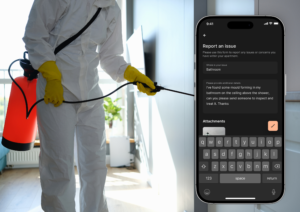 The UK property market is experiencing a significant challenge: a severe shortage of property managers. This issue, though less talked about compared to housing shortages or rising rents, has profound implications for landlords, leaseholders, tenants, and the broader property sector.
The UK property market is experiencing a significant challenge: a severe shortage of property managers. This issue, though less talked about compared to housing shortages or rising rents, has profound implications for landlords, leaseholders, tenants, and the broader property sector.
With a recent survey revealing that workload management is the number one concern for property managers, closely followed by dealing with aggressive and abusive situations, and keeping up with legislation changes, it’s no surprise that one in four property managers are now considering leaving the industry according to latest research. What’s more, property management staff consistently score well below the Office for National Statistics (ONS) averages when asked about how worthwhile their life is, their life satisfaction, and their level of happiness. The challenge therefore lies not only in finding the right people but also in retaining them.
Reasons Behind the Shortage
Increased Demand for Rental Properties
The UK has seen a significant rise in the number of people renting homes. This surge in demand for rental properties has not been matched by an increase in the number of property managers. As more properties come onto the rental market, the strain on existing property management companies intensifies.
Regulatory Changes
The property management sector has been subject to increasing regulation, including the introduction of the Building Safety Act 2022, which aims to protect residents and ensure high standards of property maintenance. While these regulations are certainly welcomed, they have increased the workload for property managers, making the job more demanding.
Aging Workforce
A large proportion of current property managers are approaching retirement age, with fewer young professionals entering the field to replace them. The industry has not been successful in attracting new talent, partly due to a lack of awareness about the career opportunities it offers.
How Technology Can Help
 The property management sector, and indeed the entire real estate industry, has traditionally served as the entry point for many young professionals into the industry. Many start their careers as property managers, gaining valuable experience and knowledge about managing buildings, before moving on to roles such as asset managers or project managers.
The property management sector, and indeed the entire real estate industry, has traditionally served as the entry point for many young professionals into the industry. Many start their careers as property managers, gaining valuable experience and knowledge about managing buildings, before moving on to roles such as asset managers or project managers.
However, these young professionals, fresh out of education, are also keen to use technology. They are not happy with just using email, Excel files, and PDFs. With the next generation of managers raised on smartphones, tablets and interactive apps replacing one brought up on paper, landlines and spreadsheets, it is natural that new digital technologies are embraced and used to transform the property management sector.
Automation
On average, property managers spend 288 hours a year performing repetitive tasks. Tasks often include sending monthly reminders for service charge demands, welcome emails to new property owners and residents, and sending key documentation such as the latest fire policies and key health and safety documents. As well as scheduling reoccurring tasks such as fire door checks, fire alarm reminders, and annual maintenance work.
Having systems in place that can automate many of these manual tasks can improve the work-life balance and productivity of property managers. This means that property managers can spend less time on administrative work and more time on the ground, conducting site inspections, meeting contractors, or building customer relationships via resident surgeries, reducing the number of complaints and improving morale.
Access a Single Centralised View of All Data
More often or not, there will be a number of disparate tools and systems in place at a property management company which means that key information can be difficult to access. With one of the requirements of the Building Safety Act 2022 being that building owners and property managers should understand the needs of every household living within the building, it’s paramount that this information is easily accessible.
Spike’s solutions have been designed to be the single view for property managers, with integrations with third-party systems including finance, CRM, and maintenance management. By pulling in data from different systems and sources, this allows property managers to see all logged activities against a property, leaseholder and resident, enabling property managers to quickly and efficiently find and access the information they need, whenever they need it. This means that property managers can spend less time digging through files and emails, and claw back some of that precious time to focus on other activities. As well as being able to have a central activity log to be used as evidence of notification, in case of future disputes.
Additionally, if a staff member leaves, all their interactions with a resident will be captured in one central system, which include files, maintenance plans, projects, certificates, preferred suppliers, and any ongoing tasks. This ensures that knowledge isn’t lost and tasks can be picked up on, helping to create continuity in service.
Enabling Leaseholders and Residents to Self-Serve
 With 81% of residents indicating that it’s important or very important to access a portal from a mobile device, having a mobile-friendly system in place is paramount. Providing a platform that leaseholders and residents can easily access empowers them to self-serve and obtain key information independently. This includes frequently asked questions, fire safety procedures, and the latest community news. With all this information readily accessible, residents can often find what they need without having to contact staff.
With 81% of residents indicating that it’s important or very important to access a portal from a mobile device, having a mobile-friendly system in place is paramount. Providing a platform that leaseholders and residents can easily access empowers them to self-serve and obtain key information independently. This includes frequently asked questions, fire safety procedures, and the latest community news. With all this information readily accessible, residents can often find what they need without having to contact staff.
Furthermore, Spike’s solutions offer transparent insights into financial transactions, allowing leaseholders to view detailed service charge statements and transaction histories, which ensures clarity and accountability in financial matters. Additionally, PMS systems and resident engagement platforms often feature secure payment portals where leaseholders can make service charge payments electronically, further enhancing transparency and convenience.
Summary
Investing in new technology presents an opportunity to improve working practices, take admin pressure off employees and, ultimately, do more with less. For many property managers, automating repetitive processes, eliminating the need for duplicate data entry, and enabling leaseholders and residents to self-serve is critical to relieving the stress around their and their teams’ jobs. This helps property managers transition from a reactive role to a more proactive one.



